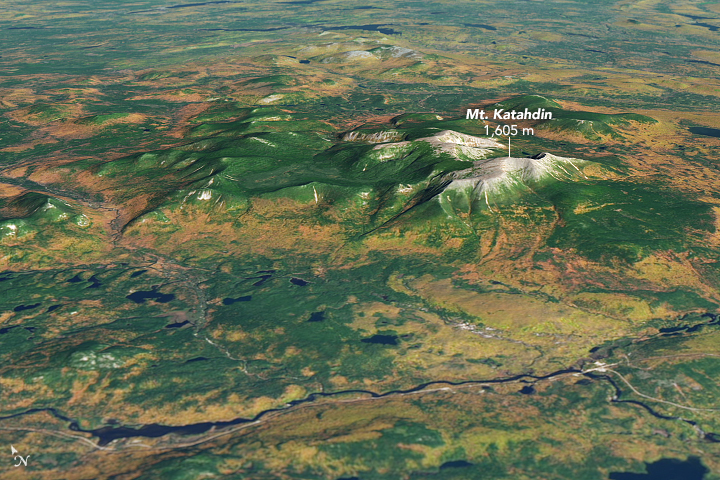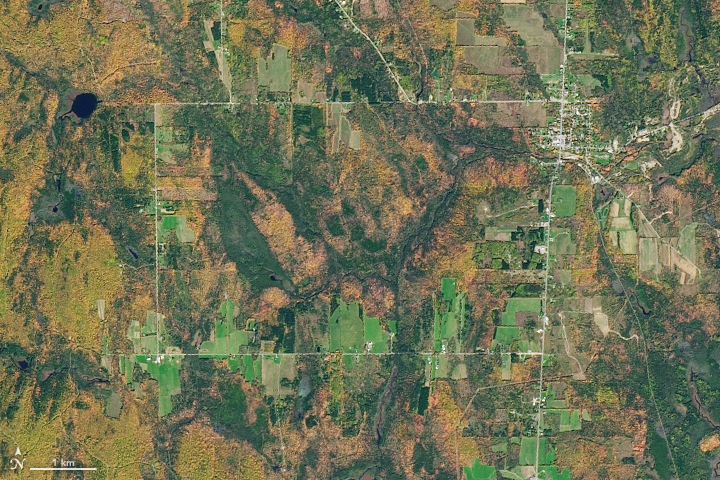
Check Out These Colors, Maine!
Downloads
- katahdin_oli_2017286_lrg.jpg (2000x1200, JPEG)
- maine_oli_2017286_lrg.jpg (8430x5620, JPEG)
Metadata
- Sensor(s):
- Terra - ASTER
- Landsat 8 - OLI
- Data Date: October 13, 2017
- Visualization Date: October 20, 2017
As autumn progresses, so does the trail of color across New England. The reds, yellows, and oranges of the season typically emerge first on the deciduous trees and shrubs at higher latitudes and elevations. That was the case on October 13, 2017, when the Operational Land Imager (OLI) on Landsat 8 captured these natural-color images of foliage in north-central Maine.
The top image shows the mountainous part of Baxter State Park, an 200,000-acre (809-square-kilometer) area of protected wilderness. The summit of Mount Katahdin rises to 5,269 feet (1,605 meters), the tallest point in the state. Vegetation growth is stunted on the mountain’s upper slopes and tablelands, which appear light tan. Moving down from the tree line you start to see evergreens, and then deciduous species with magnificent, colorful foliage. When the image was acquired, leaf color was at its local peak for 2017.
“Typically, northern Maine reaches peak conditions the last week of September into the first week of October,” according to the Maine Foliage Report. “The rest of the state’s progression of color will start occurring from north to south in mid-October. Coastal Maine typically reaches peak conditions mid-to-late October.”
About 25 miles (40 kilometers) east-northeast of Mount Katahdin, the town of Patten, Maine, also bathed in fall color. Notice how farm fields and pastures in this area stay light green in comparison to the dark green evergreens and golden deciduous trees.
Leaf color appears around the same time every year, when daylight grows shorter and triggers plants to slow and stop the production of chlorophyll. But for the best color, leaves need dry weather and cooler temperatures. According to news reports, New England’s foliage this year may not be as vibrant as other years. As of early October, many areas had not yet seen temperatures cool off much, causing leaves to go from green to brown.
-
References and Further Reading
- Baxter State Park (2017) Hike, Camp, Explore. Accessed October 20, 2017.
- Maine.gov Foliage Report for October 11, 2017. Accessed October 20, 2017.
- Maine.gov Focus Areas of Statewide Ecological Significance: Baxter Region. Accessed October 20, 2017.
- The United States National Arboretum (2011, October 6) The Science of Color in Autumn Leaves. Accessed October 20, 2017.
- USA Today (2017, October 9) Is the unusual warmth ruining the fall foliage season? Accessed October 20, 2017.
NASA Earth Observatory images by Joshua Stevens, using Landsat data from the U.S. Geological Survey and ASTER GDEM data from NASA/GSFC/METI/ERSDAC/JAROS, and U.S./Japan ASTER Science Team. Story by Kathryn Hansen.
This image record originally appeared on the Earth Observatory. Click here to view the full, original record.
